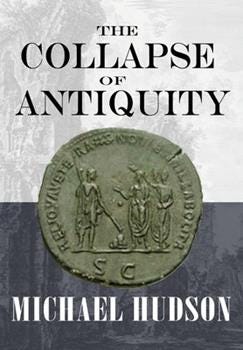THE COLLAPSE OF ANTIQUITY - MICHAEL HUDSON
Beginning of Epilogue
This is an important book. I pasted the beginning of the epilogue here, please read.
THE COLLAPSE OF ANTIQUITY - MICHAEL HUDSON
EPILOGUE
By the 5th century Rome's Empire had become a shell. Its administrative capitals had shifted northward, beyond Milan to Trier and Constantinople. In the wake of rival Roman generals hiring Germanic tribes as mercenaries to carve out their own lands, the vandals took the opportunity to conquer Rome and North Africa.
"Barbarians" always had been at the gates. What changed the balance of power was the degree to which Rome had been weakened from within by creditors monopolizing the land and reducing debtors to a state of abject dependency. The closing books of the New Testament describe the early centuries of the Roman Empire as an end time but Christianity's denunciation of the hubristic arrogance of wealth ended after Constantine made it Rome's State religion in 321. The maldistribution of land, money and other wealth was accepted as the natural order.
Even as recent scholarship has reinforced understanding of how Roman oligarchic guilt broke "free" of public oversight and ended up destroying Liberty, today's neoliberal philosophy idealizes a free market as one that provides Liberty mainly to the wealthy to act as they wish in their own self-interest as their own transactions dominate "the market'". Public regulation to restrain their self-seeking is deemed to "distort" this market by adding to "transaction costs." Such regulation is denounced as "socialism" much as Roman oligarchs denounced populist reformers as "seeking kingship."
Projecting This Modern economic ideology back to Rome, the neoliberal ideal of minimizing transactions costs meant abolishing all restraints on oligarchic land grabbing and the expropriation of the property of debtors. There was a real cost, of course, in the form of serfdom and imperial collapse. To neoliberals, these costly results are "externalities," irrelevant to their market models, which pretend that economic welfare will be maximized by individuals acting in their own self-interest. But in antiquity, Stoic and then Christian ethics were influential enough that not even the Roman oligarchy went as far as modern free marketers in idealizing selfishness as a positive force of economic efficiency. As Christianity became the Roman State religion accepted by its economic elites, it's moral focus shifted away from economic selfishness to personal egotism and the healing redemption of making bequests of one's economic gains to the church. As Augustine put matters: "Get rid of pride and wealth will do no harm."
My observation, and what Hudson implies in other parts of the book: The great problem of Western Civilization began with Augustine.
More parallels between Rome and the disaster that is the United States, and the West, follow in the epilogue. If you read the book.


